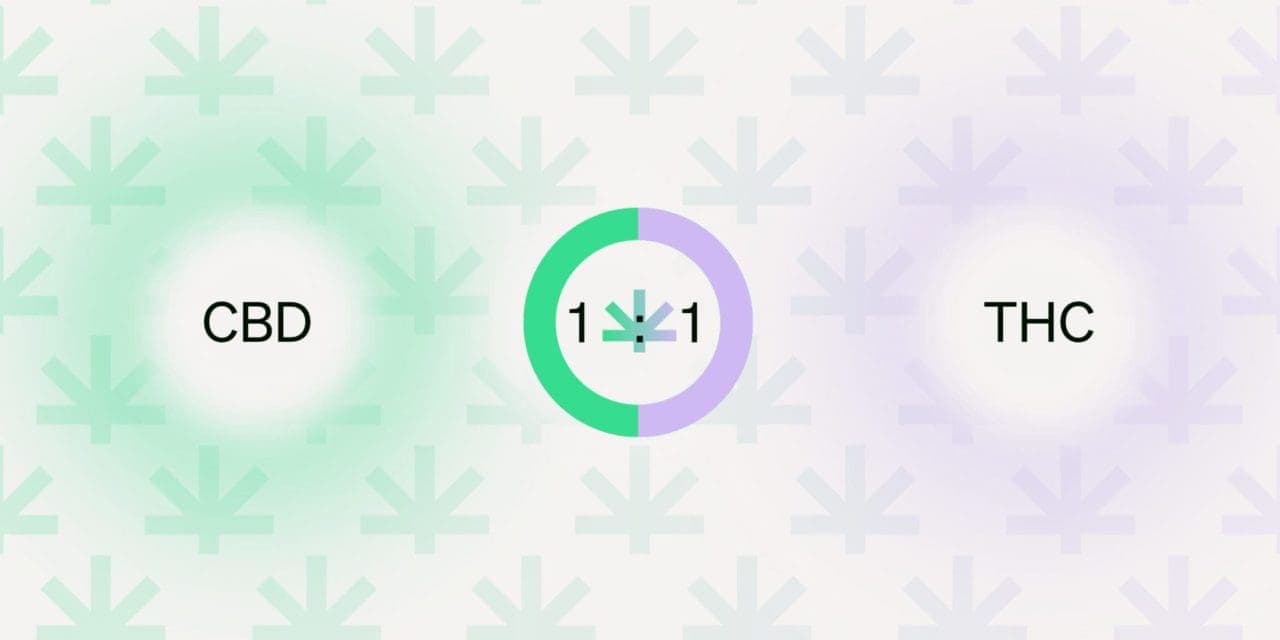The benefits of using a 1:1 CBD:THC ratio

Article written by

April AcernoContent Writer
Content reviewed by

Dr. Mitchell L. DoucetteSenior Director of Research
Cannabidiol (CBD) and tetrahydrocannabinol (THC) are the two most commonly used cannabinoids in cannabis. While each offers health benefits on its own, combining them in equal parts may be particularly effective to support your health needs.
What is a 1:1 CBD:THC ratio?
Some cannabis products contain a 1:1 CBD:THC ratio, which means equal parts CBD and THC. CBD and THC are two popular cannabinoids in cannabis that are often used for their potential health benefits.
CBD may help with:
Meanwhile, THC may help with:
- Cancer
- Multiple sclerosis (MS)
- Nausea and vomiting
- Insomnia
- Eating disorders
- Anxiety
- Glaucoma
- AIDS/HIV
- Post-traumatic stress disorder (PTSD)
- Alzheimer’s disease
- Parkinson’s disease
When taken together, CBD and THC may enhance one another’s effects to promote added relief. In fact, studies show that cannabinoids potentiate each other. This means that taking them together might boost the effects that each one contributes separately.
Research on the 1:1 CBD:THC ratio
While research is limited, some anecdotal evidence supports that products with a 1:1 CBD:THC ratio may help with certain health issues.
In particular, some studies have found that nabiximols (Sativex), a 1:1 CBD:THC prescription medication approved for use outside the U.S., helps reduce spasticity and nerve pain (neuropathy) in people who have MS.
However, more research is needed on the exact health benefits of 1:1 CBD:THC ratio products.
Can a 1:1 CBD:THC ratio help prevent side effects?
Both CBD and THC may cause some side effects, including:
- Dry mouth
- Confusion
- Dizziness
- Drowsiness
- Headache
- Nausea
- Upset stomach
- Anxiety or paranoia (particularly after taking THC)
Anecdotal reports suggest that a 1:1 CBD:THC ratio may help reduce anxiety or paranoia that can sometimes be triggered by THC. While research on this is limited, at least one study found that CBD did not significantly lower the risk of THC-related side effects.
That said, a 1:1 CBD:THC product is generally less intoxicating than one that contains pure THC. If you’re sensitive to THC’s effects, this balanced ratio may be a better fit.
Which cannabis strains have a 1:1 CBD:THC ratio?
Some cannabis strains are bred to have a 1:1 CBD:THC ratio. However, you should always check the product label to make sure it contains equal parts CBD and THC. That’s because variations in growing or processing methods can sometimes lead to slight differences in cannabinoid ratios.
These strains are known to have equal parts CBD and THC:
- Cannatonic
- Pennywise
- Pure Love
- Royal Highness
- Shark Shock
- Sweet and Sour Widow
Dispensaries often carry various types of products with a 1:1 CBD:THC ratio, including gummies, tinctures, and vaporizers.
What about other CBD:THC ratios?

Cannabis products can come in other ratios as well, including 2:1 CBD:THC, 1:2 THC:CBD, and more. While some people prefer a 1:1 ratio, you may find that another one is better suited for your needs. It can take some trial and error to find what works best for you.
The bottom line: Some research suggests a 1:1 CBD:THC ratio may offer benefits
For some people, cannabis products that contain equal parts CBD and THC are effective for helping certain health conditions. While research on this exact 1:1 ratio is limited, some evidence suggests it may help with certain MS symptoms, such as nerve pain and spasticity.
If you’re seeking relief from a specific health condition, a healthcare professional can help you find the best cannabis products to support your needs. Schedule an appointment with a Leafwell pharmacist to ask them about 1:1 CBD:THC products, and whether or not they’re right for you.
Resources
- Cannabidiol potentiates Δ9 -tetrahydrocannabinol (THC) behavioural effects and alters THC pharmacokinetics during acute and chronic treatment in adolescent rats. https://ww2.uthscsa.edu/artt/addictionjc/2018-05-08-klein.pdf
- Does cannabidiol make cannabis safer? A randomised, double-blind, cross-over trial of cannabis with four different CBD:THC ratios. https://pmc.ncbi.nlm.nih.gov/articles/PMC10156730/
- Sativex in the management of multiple sclerosis-related spasticity: Role of the corticospinal modulation. https://pmc.ncbi.nlm.nih.gov/articles/PMC4325203/
- Sativex successfully treats neuropathic pain characterised by allodynia: A randomised, double-blind, placebo-controlled clinical trial. https://pubmed.ncbi.nlm.nih.gov/17997224/
Frequently asked questions
Continue reading to learn more about 1:1 CBD:THC cannabis products.


